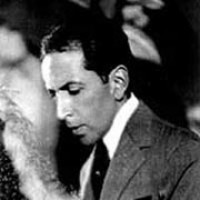L'Herbier was a French director, screenwriter and producer. He made his biggest contribution to the history of film when he founded the
Institut des hautes études cinématographiques (IDHEC) in Paris in 1943, which became an important film school later finished by Louis Malle, Alain Resnais, Volker Schlöndorff, Jean-Jacques Annaud, Costa-Gavras. L'Herbier studied law and before starting to work on film he wrote dramas, essays and poetry. During WW I he worked as a cinematographer for the army and in the 1920s he played an important role in the development of French avant-garde film. In 1922, he founded his production house Cinégraphic, and his experimental films influenced the work of Albert Cavalcanti and Claude Autant-Lara with whom he later collaborated. When he started making sound films their quality lessened and in 1952 he began to work on television. His most important films include his first silent feature film
Rose-France (1918),
L' homme du large (Man of the Sea, 1920) and
Eldorado (1921). In 1924 he made the ambitious
L' inhumaine (The Inhuman Woman), in 1925
Feu Mathias Pascal (The Living Dead Man), in 1928 the French-German co-production
L' argent. His other films are his first sound film
L'enfant de l'amour (Illegitimate Child, 1930),
Le bonheur (1934) and
La nuit fantastique (Fantastic Night, 1942).

